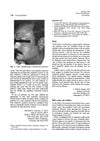 10 citations,
May 2015 in “International Journal of Women's Dermatology”
10 citations,
May 2015 in “International Journal of Women's Dermatology” New treatments for skin and hair disorders in women of color address unique biological differences and include specific acne medications, sunscreens, skin lighteners, and hair care adjustments.
[object Object] 9 citations,
January 2012 in “International journal of trichology” Trichostasis spinulosa can be diagnosed with a simple skin biopsy and treated with specific gels, but lesions may return after stopping treatment.
8 citations,
January 2017 in “Indian dermatology online journal” Traumatic anserine folliculosis is a skin condition caused by friction, treatable with topical cream and avoiding trauma.
 8 citations,
May 1998 in “Journal of Oral and Maxillofacial Surgery”
8 citations,
May 1998 in “Journal of Oral and Maxillofacial Surgery” Acne is caused by increased sebum, abnormal skin shedding, bacteria, and inflammation, not dirt; treatments vary from creams to antibiotics or isotretinoin, with severe cases needing a dermatologist's care.
 6 citations,
September 2012 in “Our Dermatology Online”
6 citations,
September 2012 in “Our Dermatology Online” Retinoids are effective for various skin conditions and hair loss but have serious side effects, so low doses are recommended.
 6 citations,
December 2010 in “Journal of Investigative Dermatology”
6 citations,
December 2010 in “Journal of Investigative Dermatology” Albert M. Kligman made major contributions to dermatology, including inventing a stain for fungi and advancing knowledge on skin diseases, and his legacy continues through his trainees and philanthropy.
6 citations,
December 1987 in “Mayo Clinic proceedings” Retinoids are effective for severe acne and psoriasis but can cause serious side effects and birth defects.
6 citations,
August 1985 in “Archives of dermatology” A lotion helped remove hair casts, which seem to come from a specific part of the hair follicle, and patients with hair casts can be grouped based on the cause.
5 citations,
September 2021 in “Clinical case reports” GLPLS is a rare skin condition with specific hair loss and skin symptoms.
5 citations,
February 2016 in “Sultan Qaboos University medical journal” The patient had a severe itchy rash and hair loss in the armpits.
 5 citations,
February 2015 in “JEADV. Journal of the European Academy of Dermatology and Venereology/Journal of the European Academy of Dermatology and Venereology”
5 citations,
February 2015 in “JEADV. Journal of the European Academy of Dermatology and Venereology/Journal of the European Academy of Dermatology and Venereology” OCT can non-invasively diagnose follicular keratosis and other hair follicle disorders.
 5 citations,
January 2014 in “Current Dermatology Reports”
5 citations,
January 2014 in “Current Dermatology Reports” Many adult women suffer from persistent or late-onset acne, and while various treatments exist, finding the right one can be challenging.
 5 citations,
February 2013 in “Expert Review of Dermatology”
5 citations,
February 2013 in “Expert Review of Dermatology” New acne treatments include combination creams, advanced retinoids, and light therapies, focusing on safety and patient adherence.
 5 citations,
March 2006 in “Journal of Investigative Dermatology”
5 citations,
March 2006 in “Journal of Investigative Dermatology” Albert M. Kligman, who turned 90 on March 17, 2006, made significant contributions to dermatology, including creating treatments for acne and studying skin aging.
5 citations,
August 1999 in “Disease-a-month” Hormonal imbalances can cause acne, and treatments may include hormone-blocking medications.
[object Object] 5 citations,
January 1999 in “Journal of dermatological treatment” Bioré Pore Perfect strips effectively and safely clean pores on the nose.
4 citations,
January 1996 in “British journal of dermatology/British journal of dermatology, Supplement” Mexican hairless dogs can help test new skin treatments.
 2 citations,
August 1994 in “Archives of dermatology”
2 citations,
August 1994 in “Archives of dermatology” A 19-month-old boy with a rare hair disorder showed mild improvement with treatment, but his family chose gentle hair care due to limited success.
 1 citations,
July 2023 in “Journal of Clinical Medicine”
1 citations,
July 2023 in “Journal of Clinical Medicine” Different causes of beard hair loss have various treatments, including medications, lifestyle changes, and procedures to stimulate hair growth.
1 citations,
September 2021 in “Rossijskij žurnal kožnyh i veneričeskih boleznej” Osteoma cutis is a rare, benign skin condition where bone forms in the skin.
 1 citations,
April 2018 in “Journal of Investigative Dermatology”
1 citations,
April 2018 in “Journal of Investigative Dermatology” Fzd2 is important for skin and hair development through various signaling ways.
 1 citations,
January 2015 in “Journal of Pigmentary Disorders”
1 citations,
January 2015 in “Journal of Pigmentary Disorders” Treating melasma in men is difficult, especially for the deeper skin layers, and may need more than just topical treatments.
 1 citations,
January 2005 in “Side effects of drugs annual”
1 citations,
January 2005 in “Side effects of drugs annual” The document concluded that various dermatological treatments have different effectiveness and side effects, with some causing irritation, allergic reactions, or systemic effects.
1 citations,
December 1995 in “Archives of Dermatology” The combination of topical minoxidil and oral finasteride improved hair regrowth in a man with advanced hair loss.
 1 citations,
January 1989 in “Journal of The American Academy of Dermatology”
1 citations,
January 1989 in “Journal of The American Academy of Dermatology” The conclusion is that proper communication about the realistic effects of hair loss and skin aging treatments can improve dermatologists' credibility.
 April 2024 in “Indian dermatology online journal”
April 2024 in “Indian dermatology online journal” A rare hair follicle disorder can cause itchy, bluish-black bumps on the body.
 January 2024 in “SAGE Open Medical Case Reports”
January 2024 in “SAGE Open Medical Case Reports” Minoxidil can help increase facial hair growth.
 January 2024 in “Dermatology Review”
January 2024 in “Dermatology Review” Current treatments for androgenetic alopecia are limited, but research is ongoing to find better solutions.
April 2023 in “Media Dermato Venereologica Indonesiana” COVID-19 reinfection may trigger alopecia areata.
 November 2022 in “Journal of Investigative Dermatology”
November 2022 in “Journal of Investigative Dermatology” The document concludes that a new method has been developed to test anti-aging substances on human skin, showing that these substances can reduce skin aging signs.

















